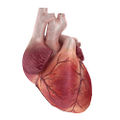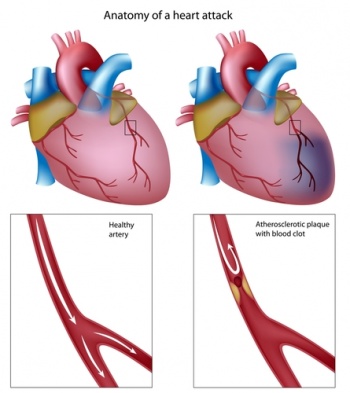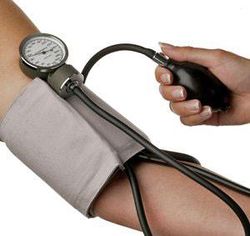Myocardial infarction (Heart Attack)
A myocardial infarction or MI occurs when the blood supply to some part of the heart muscle is abruptly stopped. MIs are caused by a number of factors. In most cases a thrombus associated with plaque rupture occludes arteries, also less frequently embolization of arteries leads to MI or coronary spasm in the absence of plaque in arteries.[1]
|
Myocardial Infarction (Heart Attack) | |
| Causes | Dietary Factors, Smoking, Environmental Toxins, Stress, Prescription Medications |
|---|---|
| See Also | Cardiovascular Conditions, Obesity, Hypertension, Diabetes |
| Books | Books on Cardiovascular Conditions |
| Articles | Articles on Cardiovascular Conditions |
Naturopathic Assessment
The assessment of a heart attack is commonly based on a person's history and on a physical exam. Since there are many causes of chest pain the first task of a naturopathic doctor or any other primary care physician is to rule out life threatening conditions.[2]
Causal Factors
In order to stimulate the innate ability of the body to heal the causes of disease must be identified and addressed. With Myocardial infarction, the causes are variable and include lifestyle, social and environmental factors. A detailed assessment is required to determine which risk factors are contributing to the overall risk an individual has of suffering a heart attack.
Lifestyle
| Article | Nutritional Treatments for Acute Myocardial Infarction , Alt Med; 2010;Vol15(2) |
|---|
| Article | Blood Viscosity, Earlier More Accurate Predication of Cardiovascular Event Risk, NDNR; 2012 October[1] |
|---|
| Check out this book | The Anti-Inflammation Diet and Recipe Book: Protect Yourself and Your Family From Heart Disease, Arthritis, Diabetes, Allergies - and More |
|---|
- Consuming a poor diet low in fruits and vegetables and high in saturated fats is associated with increased risk for MI and other cardiovascular diseases.[2]
- Alcohol abuse is a risk factor for atherosclerosis and MIs.[3]
- Smoking or exposure to second hand smoke can be a risk factor for atherosclerosis and MIs.[3]
Social
- Stress is a risk factor for atherosclerosis and MIs.[3]
- Stress may increase the stickiness of blood and make it more likely to clot.[4]
- Anxiety, fear, anger, grief and stress may precipitate an MIs as there is an increase in adrenaline and noradrenaline release. These hormones increase the work of the heart, making it beat faster.[5]
Environmental
- Particulate matter or air pollution is associated as a risk factor for cardiac arrhythmia, exacerbates congestive heart failure, and can trigger acute myocardial infarction.[6]
Medical Interventions
- Prescription Medications
- Digoxin, furosemide or cholesterol drugs indicates risk factors for cardiovascular disease and greater suspicion of MI.[2]
- Reserach is lacking to support the use of hormone replacement therapy for the prevention of heart disease.[7]
Genetics
- Heart attacks tend to run in families.[3]
Common Questions
Common questions regarding a heart attack include:[3]
- Is there a family history of angina pectoris?
- History of chest pain?
- Any murmurs or arrhythmia?
- Risk factors for coronary heart disease?
- Hypertension?
- Diabetes?
- Medications?
They would also inquire about your dietary and lifestyle habits, your exercise regimen and any acute or chronic stressors.
Diagnostic Testing
The tests used to determine if you had a heart attack and the severity of damage include:
- Blood tests including Creatine Kinase (CK), Creatine Kinase (MB), CRP, hs-CRP, proBNP, D-Dimer, Myoglobin, Troponin
- Other tests include an electrocardiogram (ECG/EKG), Stress test or Heart rate variability testing.
Related Symptoms and Conditions
The factors which increase the risk of a heart attack include:[3]
- Obesity or a BMI over 30 is a risk factor for MIs.
- Hypertension, hyperlipidemia with high LDL/HDL ratio and low HDL.
- Type II Diabetes
- Hyperhomocysteinemia
Conditions that tend to mimic the symptoms of a heart attack include:
- GERD (Gastroesophageal reflux disease) and PUD (Peptic ulcer disease) are both non-cardiac causes of chest pain, as well as problems with the esophagus like achalasia or esophageal spasms. [2]
- Costochondritis or bruised and broken ribs need to be differentiated from myocardial infarction – usually the doctor can reproduce the pain caused by these musculoskeletal injuries during physical exam and locate the pain precisely.[2]
- Drug use including cocaine can cause intense coronary spasm and may present like myocardial infarction or angina.[1]
- Anxiety and panic attacks can present like a heart attack.[8]
Characteristics
Myocardial infactions occur due to clotting in a coronary blood vessel. Blood supplying the heart muscle comes entirely from two coronary arteries, both lying along the outside surface of the heart. The death of a portion of the heart muscle is considered a myocardial infarct, and the amount of the heart affected by the sudden occlusion will determine the severity of the attack. Myocardial infarction is usually due to left ventricular damage but may occur in the right ventricle, infarcts are classified as such according to precise location and depth.[9]
Common Symptoms
Signs and symptoms include:[2]
- Sweating, fatigue, anxiety, fast heart rate, fast respiration rate, shortness of breath, pallor, nausea, and vomiting. Pressure or crushing sensation in the chest typically in the center of chest which may radiate to the shoulder, arm or jaw.
- The pain of on MI typically lasts at least 30 minutes and is not solicited by physical exam by the doctor.
- With severe MI congestive heart failure may occur causing neck vein distention, pulmonary rales, or extra heart sounds like S3 or S4.
- Hypotension, shock, or new murmurs may develop.
- It is important to note that in elderly populations up to 25% of heart attacks occur in the absence of chest pain but there may be CHF, shock, or confusion, especially when complicated by diabetic neuropathy.[2]
Naturopathic Treatment
The goal of naturopathic treatment is to support and work in tandem with the healing power of the body and to address the causal factors of disease with individual treatment strategies. A strength of naturopathic medicine is to identify and addressing underlying conditions such as hypertension, atherosclerosis and congestive heart failure which increase the risk of a heart attack.[10]
Determining the prognosis for myocardial infarction depends on the speed with which treatment is sought in some cases. Immediate referral is prudent when MI is suspected. Likewise the extent of damaged cardiac muscle depends on the size of coronary vessels affected and the quantity.[11]
If you or someone you know is having a heart attack you should seek emergency medical care at the closest hospital. Naturopathic care can help prevent heart attacks over the long term or help with the recovery after emergency medical care, but in an acute situation an ER is necessary. Advancements in treatment have increased survival and recovery.[11]
It is always advisable to work with a naturopathic doctor before engaging in any treatment plan.
Home Care
Home Care strategies include:
- Becoming educated on healthy dietary and lifestyle practices outlined below.
- After a heart attack it is helpful to monitor your blood pressure at least bi-weekly.
Lifestyle
Lifestyle recommendations include:
- Dietary recommendations
- Increase dietary fibre through vegetables, nuts and seeds, legumes and 100% whole grains at each meal and increase fresh raw fruits for snacks.[12] [13]
- Use olive oil and small amounts of butter while avoiding rancid oils, deep fried foods, margarines, shortening and heating of polyunsaturated oils.[12]
- Limit saturated fat intake to less than 7% of energy, trans fat to less than 1% of energy and cholesterol to 300mg per day.[13]
- Avoid sugar in concentrated forms such as sucrose, glucose, fructose, white sugar, brown sugar, corn syrup, maple syrup, honey and molasses. [12][13]
- Eliminate caffeine in all forms such as coffee, tea, colas and chocolate.[12]
- Limit alcohol intake to less than 5 a week.[12][13]
- Avoid processed meats as they contain [Food Additives|preservatives]] such as nitrates and nitrites, additionally avoid all food preservatives.[12]
- Avoid added salt in foods.[13] Less than 3g per day.[10]
- Eat fish twice per week.[12][13]
- Drink adequate water daily.
- Avoid smoking
- Ensure adequate sleep, which generally means about 7 hours a night
- Controlled exercise to maintain circulation without causing rupture of scar tissue is advised.[11]
- Walk 30 - 40 minutes a day.
- Maintain healthy body weight by knowing your caloric needs and knowing the caloric content of foods you consume versus how much you are exercising and burning calories.[13], [11]
Naturopathic Therapies
The prescribing of naturopathic therapies requires the guidance of a naturopathic doctor as it depends on a number of factors including the causal factors, a person's age, prescription medications, other conditions and symptoms and overall health. It is always advisable to work with a naturopathic doctor prior to taking any natural therapies.
Naturopathic Therapies for myocardial infarctions include:
- Minerals such as magnesium
- Other supplements such as L-carnitine[14], Omega-3 Fatty Acids
- Herbs such as Hawthorn (Crataegus), Yarrow (Achillea millefolium), Linden (Tilia spp.), Siberian Ginseng (Eleutherococcus senticosus), Gingko (Gingko biloba), Garlic (Allium sativum)[9], Turmeric (Curcuma longa)
- Gemmotherapies such as Cornus sanguinea, Zea mays
References
Reviewed by Iva Lloyd, BScH, RPE, ND [2]
- ↑ 1.0 1.1 Berga S, Bowman M, Drossman D, Faling J, Frenkel E, Gabbard G et al. editors.(1992) The Merck Manual of Diagnosis and therapy 16th edition. Rathway: Merck & Co Inc.
- ↑ 2.0 2.1 2.2 2.3 2.4 2.5 2.6 2.7 El-Hashemy Shehab (2007) Naturopathic Standards of Primary Care CCNM Press Inc.
- ↑ 3.0 3.1 3.2 3.3 3.4 3.5 Piscopo Gary, Yarnell Eric (2010) Naturopathic Clinical Boards Study Manual Volume I. Healing Mountain Publishing Inc.
- ↑ tbr
- ↑ Spieker L, Noll G (Nov 2003) Pathophysiologic cardiovascular changes in stress and depression Ther Umsch.;60(11):667-72.
- ↑ Ueda K, Nitta H, Ono M (2009) Effects of fine particulate matter on daily mortality for specific heart diseases in Japan. Circ J;73(7):1248-54. PMID:19423947.
- ↑ 73rd Scientific Session of the American Heart Association. (Nov 2000) AHA
- ↑ tbr
- ↑ 9.0 9.1 Hoffmann David (1992) Therapeutic herbalism: A correspondence course in phytotherapy
- ↑ 10.0 10.1 Prousky Johathan, Hoffer Abram (2008) Principles and Practices of Naturopathic Clinical Nutrition CCNM Press.
- ↑ 11.0 11.1 11.2 11.3 Mulvihill, Selman, Holdaway, Tompary, Raymond editors (2006) Human Diseases – A Systemic Approach 6th ed. Pearson Educatin Inc.
- ↑ 12.0 12.1 12.2 12.3 12.4 12.5 12.6 Rowland David (2006) The Nutritional Bypass - Reverse Atherosclerosis Without Surgery. Canada Ic. Rowland Publications.
- ↑ 13.0 13.1 13.2 13.3 13.4 13.5 13.6 Lichtenstein A, Appel L, Brands M, Carnethon M, Daniels S, Franch H, Franklin B et al. (2006) Diet and lifestyle recommendations revision 2006: A scientific statement from the American Heart Association Nutrition Committee. Circulation;114(1):82-96. PMID:16785338
- ↑ Iliceto S, Scrutinio D, Bruzzi P, D’Ambrosio G, Boni L, Di Biase M, Biasco G, Hugenholtz P, Rizzon P (Aug 1995) Effects of L-carnitine administration on left ventricular remodeling after acute anterior myocardial infarction: The L-carnitine ecocardiografia digitalizzata infarto meocardico trail (CEDIM). JACC;26(2):380-7.PMID:7608438.
- ↑ 15.0 15.1 Kuoch David(2011) Acupuncture Desk Reference. 2nd ed. Acumedwest Inc.:pg290-307


